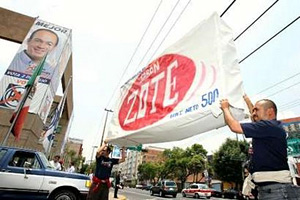 |
 |
 |
 Editorials | At Issue | May 2006 Editorials | At Issue | May 2006  
Calderón Leads, but Outcome Unclear
 Kelly Arthur Garrett/The Herald Mexico Kelly Arthur Garrett/The Herald Mexico


| | Supporters of Andres Manuel Lopez Obrador, presidential candidate of Mexico's left-wing Party of the Democratic Revolution (PRD), protest in front of the headquarters of the National Action Party (PAN) in Mexico City May 15, 2006. The supporters, holding a symbolic bar of soap, called for a cleaner campaign. (Reuters/Daniel Aguilar) |
The latest voter preference poll released by EL UNIVERSAL Sunday confirmed conservative Felipe Calderón's slight lead in the presidential race, and validated the National Action Party candidate's decision to unleash a barrage of negative campaigning aimed at branding his chief opponent, former front-runner Andrés Manuel López Obrador, as “a danger to Mexico.”

But neither the El Universal survey, nor six others released since the morning of the April 25 televised candidates' debate, has settled the question on every body's mind: Who is going to be the next president of Mexico?

“The more you parse the poll, the more even the contest seems at this stage,” said Dan Lund, president of the MUND Américas research firm, on Monday.

The poll has Calderón with 39 percent of likely voters, López Obrador of the Party of the Democratic Revolution (PRD) with 35 percent, and the Institutional Revolutionary Party's (PRI’s) Robert Madrazo at 21 percent. Calderón gained five points since the last, pre-debate El Universal poll, while López Obrador, who skipped the debate, fell three.

There has been a 14-point swing since March, when López Obrador held a 10-point advantage over Calderón. Since then, Calderón has pounded hard on the “danger” theme, accusing the PRD candidate of running up debts while mayor of the capital and of accepting help from Venezuelan President Hugo Chávez.

More recently, Calderón has tried to associate López Obrador with the violent tactics of community groups in the troubled State of Mexico town of San Salvador Atenco, and with the newly re-energized Zapatista rebel leader Subcomandante Marcos.

The charges have been denied by the López Obrador campaign, and generally scoffed at by political observers. Historian and political analyst Lorenzo Meyer, for example, called Calderón's contention that the D.F. had suffered reckless indebtedness, “contrary to figures available from the feder al government itself.”

The National Action Party (PAN) effort to link López Obrador (AMLO) with Chávez and Marcos appears to have helped his poll numbers, but it's drawn criticism as well. “Without offering any evidence, they're suggesting something that smacks of treason — that AMLO is supported by 'Bolivarian cells' sent by the Venezuelan president,” Meyer wrote in his weekly Reforma column. “Then in an act as opportunistic as it was unethical, the PAN candidate decided to connect AMLO with the violent re cent events in Atenco to reinforce the idea (that he is a) danger.”

The El Universal survey was conducted from May 5 to May 8, in the immediate aftermath of the Atenco riots and arrests. Television images of the violence were fresh in the minds of potential voters, but the full extent of the feder al police brutality and abuse of detainees was only just emerging. It is likely that the impact of the Atenco crisis and its aftermath is yet to be felt in the polls, though it's unclear which of the three major candidates will benefit.

“It remains to be seen how the electorate will process the information.” said political scientist Leo Zuckerman.

Another analyst, Rogelio Hernández Rodríguez, expects Calderón to continue using the media to link his opponent with instability. “Atenco and Marcos' recent actions have given the rightwing PAN an extraordinary instrument for exploiting the fears of the undecided middle-class voters,” he wrote Monday in El Universal.

The López Obrador camp expects the same thing. “It would appear they're not going to stop as long as the polls says it's working,” said PRD deputy Manuel Camacho Solis, who is helping to run López Obrador's campaign.

But Camacho ruled out any counteroffensive. “The worst thing to do is take the provocation and answer back in the same kind of language,” he said. “His adversaries are really giving Andrés Manuel a golden opportunity to show that he is a responsible leader even when harassed.”

Calderón was the least known of the three major candidates at the beginning of the year. But by claiming the lead in seven different polls since April 25, he has, in Lund's words, “confirmed his the sis that he is the rising candidate.” Each poll reflects voter preference in the same period (late April, early May) but since they came out one at a time, generating different headlines, Calderón is using the “poll buzz” to project an image of being on a roll.

That could be misleading, according to Iván Castro Rivadeneyra, a director at TNS Gallup in Mexico. “When polls are converted into instruments of managed communications, they lose their true meaning,” he told El Universal Monday.

Lund said that while López Obrador's support is mostly “preference-driven,” Calderón's new lead is “media-driven,” — that is, the result of a television and radio campaign. “For that reason, the lead is fragile, and may slide away or be difficult to mobilize on election day,” he said.

It's possible, in fact, that Calderón's apparent momentum is an illusion. In addition to which candidate they were likely to vote for, the El Universal polling sample was asked which candidate they thought was going to win. The result was a 30-30 tie between López Obrador and Calderón.

“Momentum in a campaign can turn on a dime,” Lund said. “One month's rising candidate can stall.” | 
 | |
 |



